Why would anyone live in a listed building?
When Zoë Cave Hawkins bought a run-down townhouse in the heart of the cathedral city of Winchester, she was fully aware that getting permission to update the Grade II-listed property was going to be a bit of a hassle. But the reality was far worse than she could have imagined. As fast as her architects could draw up plans, a phalanx of planning officers, listed building officers and conservation officers would descend to rip them up. A proposal to build a terrace above the new flat-roofed kitchen extension was nixed because it would mean replacing a series of original windows on the first floor with modern French doors. A new door to an







